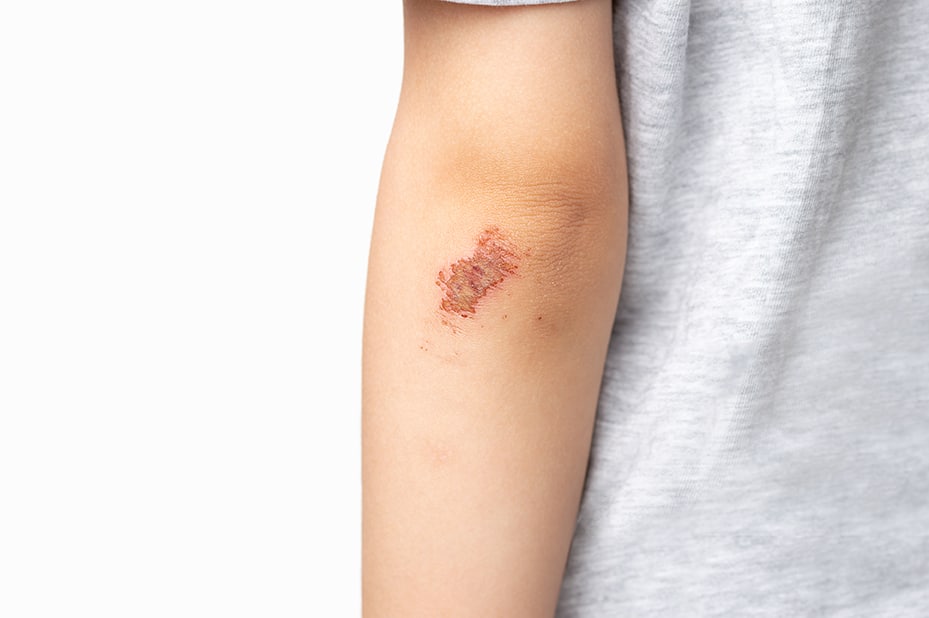Healing and Scratching, Why Wounds Itch

Wound healing is a complex process that our bodies naturally undergo when we get injured. While this process is essential for recovery, it often comes with an annoying side effect: itching. If you’ve ever wondered, “why do wounds itch?”, you’re not alone. This article will take you through the stages of wound healing, explain why itching occurs, what causes it, and how you can alleviate it. We’ll also introduce NuNature First Aid Gel, a product designed to support the healing process and help manage that persistent itch.
The Healing Process: A Quick Overview
When you sustain a wound, your body immediately begins the healing process, which can be broken down into four primary stages:
- Hemostasis: The moment you’re injured, your body works to stop the bleeding by forming a clot. Platelets in your blood come together to seal the wound, preventing further blood loss.
- Inflammation: This stage begins shortly after hemostasis and lasts for a few days. Your immune system sends white blood cells to the wound site to fight off infection. This is also when you might notice redness, heat, and swelling around the wound.
- Proliferation: During this stage, new tissue begins to form. Your body produces collagen, which helps to close the wound, and new blood vessels are created to bring oxygen and nutrients to the healing tissue. This stage can last several weeks, depending on the severity of the wound.
- Maturation: Also known as the remodeling phase, this stage involves the strengthening of the new tissue. The collagen fibers reorganize, and the wound continues to contract, becoming less noticeable over time. This phase can take months or even years.
Why Do Wounds Itch?
Itching is a common and often frustrating symptom during wound healing. But why do wounds itch? The answer lies in the body’s natural healing mechanisms and the changes that occur in the skin as the wound repairs itself.
What Causes the Itch?
Several factors contribute to the itching sensation during the healing process:
- Histamine Release: During the inflammation stage, your body releases histamines as part of the immune response. Histamines help to fight off potential infections but also trigger nerve endings in your skin, leading to itching.
- Nerve Regeneration: As your wound heals, nerve endings that were damaged during the injury begin to regenerate. This regrowth can stimulate the nerves, causing an itching sensation.
- Dry Skin: As the wound heals and the scab forms, the skin around the wound can become dry and tight. This dryness can exacerbate itching, especially as the new skin begins to stretch.
- Collagen Production: During the proliferation stage, the body produces collagen to close the wound. The tightening of the skin due to collagen formation can also lead to itching.
How to Help the Itch
Managing the itchiness of a healing wound is important not only for comfort but also to prevent further injury from scratching. Here are some effective ways to help alleviate the itch:
- Keep the Wound Moist: One of the best ways to reduce itching is to keep the wound moisturized. NuNature First Aid Gel is an excellent option for this. It helps maintain a moist environment around the wound, which not only supports faster healing but also minimizes dryness, reducing the urge to scratch.
- Avoid Scratching: It may be tempting, but scratching can reopen the wound and lead to infection. Instead, gently press on the area or apply a cool compress to soothe the itch.
- Use Anti-Itch Products: Applying a product specifically designed to relieve itching, like an over-the-counter hydrocortisone cream, can help. However, it’s important to consult with a healthcare professional before applying any new product to a healing wound.
- Stay Hydrated: Drinking plenty of water and using a humidifier can keep your skin hydrated from the inside out, which can help reduce overall skin dryness and itching.
How Long Does It Take for a Wound to Heal?
The time it takes for a wound to heal depends on various factors, including the size and depth of the wound, your overall health, and how well you care for the wound. On average:
- Minor cuts and scrapes: 1-2 weeks
- Deeper wounds: 3-4 weeks
- Surgical incisions: 6-8 weeks
During this time, it’s crucial to follow proper wound care guidelines, including using products like NuNature First Aid Gel to keep the wound moist and support the natural healing process.
Wound healing is a vital process that can sometimes be uncomfortable, especially when itching is involved. Understanding why wounds itch and how to manage it can make the healing journey much easier. With products like NuNature First Aid Gel, you can support your wound’s healing process while alleviating the discomfort of itching. Remember, keeping your wound moist and resisting the urge to scratch are key steps to ensuring a smooth recovery.




